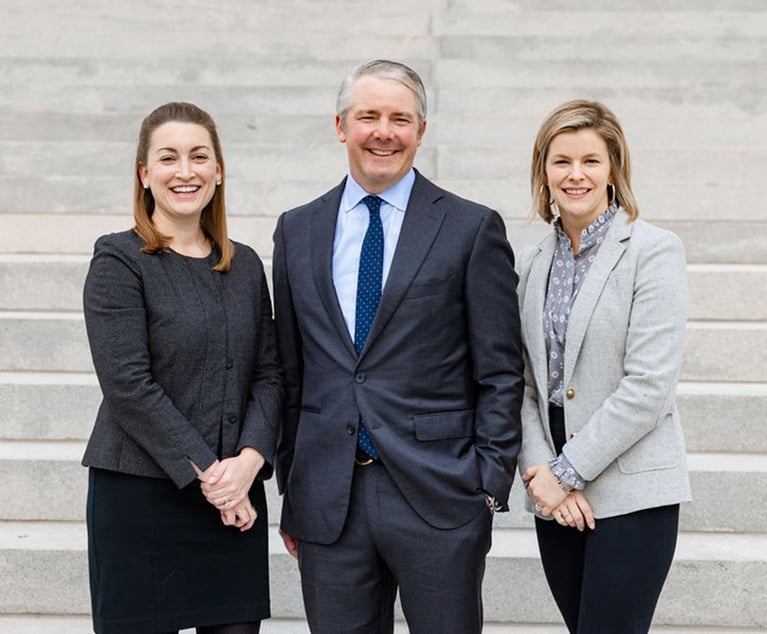 Judge Robert Wilkins of the District of Columbia Circuit. Credit: Diego M. Radzinschi / NLJ
Judge Robert Wilkins of the District of Columbia Circuit. Credit: Diego M. Radzinschi / NLJJustice Department's Push to Revive AT&T Case Hits Skeptical DC Circuit Panel
AT&T, represented by Sidley Austin partner Peter Keisler, defended the Washington trial judge's ruling and argued the Justice Department's case was based on flimsy economic modeling.
December 06, 2018 at 03:11 PM
6 minute read
Six months after failing to block AT&T's merger with Time Warner, the Justice Department urged a Washington federal appeals court Thursday to undo the multibillion-dollar merger deal, arguing that the combination creates a telecom giant with near-unbridled bargaining power.
The blockbuster hearing drew a close-to-capacity crowd to the U.S. Court of Appeals for the D.C. Circuit, where a three-judge panel heard arguments in what is widely considered the most significant antitrust case in decades. The panel—including Judges Robert Wilkins, Judith Rogers and David Sentelle—questioned four lawyers for two hours, allowing the advocates to speak well beyond their allotted time. As Sentelle said early on in the hearing, “We're not very good at obeying the clock.”
In antitrust circles, the case was closely watched from the beginning as a rare example of the government contesting a so-called vertical merger. AT&T and Time Warner completed their merger in June after U.S. District Judge Richard Leon of the District of Columbia rebuffed the Justice Department's challenge to the deal, which combined a pay-TV distributor with the content provider behind HBO and Turner channels such as CNN, TBS and TNT.
At the outset of his arguments, Justice Department attorney Michael Murray said the deal would give AT&T the leverage to blackout content and threaten to poach other companies' customers if rival distributors “don't pay up.” Murray said Leon erred in his June ruling by considering whether blackouts would happen as a result of the merger, rather than whether the threat of blackouts would give AT&T undue leverage.
AT&T, represented by Sidley Austin partner Peter Keisler, defended Leon's ruling and argued the Justice Department's case was based on flimsy economic modeling.
Makan Delrahim, the assistant attorney general in charge of the Antitrust Division, attended the hearing along with the government's lead trial lawyer, Craig Conrath. Conrath at one point shook hands and spoke briefly with his trial adversary, Dan Petrocelli, the O'Melveny & Myers partner who mounted AT&T's defense. Petrocelli sat during the hearing at the same table as Keisler and Mayer Brown partner Andy Pincus, who filed an amicus brief for 37 economists and former government officials in support of Leon's decision.
Here are some highlights from Thursday's hearing:
|What happens if the government loses?
From the time the Justice Department sued to block the AT&T-Time Warner merger, observers said a loss for the government could spell trouble for future attempts to block vertical mergers. Keisler on Thursday downplayed the consequences of a government loss for the future of antitrust enforcement, saying that an affirmation of Leon's decision would not prevent the government “from bringing factually-supported vertical merger cases in the future.” Rather, he said, a decision for AT&T would set the precedent that economic modeling needs to be based on reliable data to receive credibility in court. “That's all the case stands for,” he said.
|AT&T says it's not kidding about resolving fee disputes through arbitration.
Keisler touted an offer AT&T has made to networks that would allow fees to be set through arbitration for at least the next seven years. As AT&T was pursuing the Justice Department's approval for the Time Warner deal, Keisler said the company looked to the conditions imposed on Comcast's acquisition of NBCUniversal, which required Comcast to submit to arbitration for disputes over price terms.
The arbitration condition was “sufficient then,” Keisler said, so AT&T thought it would be “sufficient now” with the Time Warner deal. That turned out not to be the case.
Because of the arbitration offer, Keisler said, “Turner has less leverage as a result of the merger.” When the judges questioned whether AT&T would remain committed to arbitrate pricing disputes, Keisler replied, “We are absolutely committed to this.”
“We don't make an offer in the market … with our fingers crossed behind our back,” he said.
Murray noted that, in the Comcast deal, the arbitration condition was backed by a “de novo arbitral review” by the Federal Communications Commission.
|One judge questioned whether the government “overtried” its case.
As Keisler hammered the government's modeling, Wilkins noted the Justice Department's argument that the analysis was not necessarily crucial to the case. Wilkins suggested that the government had perhaps “overtried” the case by presenting more evidence than it needed. Sometimes, he said, the government takes a “belt and suspenders” approach and “then the suspenders break.” Keisler replied that the economic model was, in fact, critical to the government's case. Remove it from the government's challenge, he said, and there's “nothing here.”
|No, really, how much will consumers actually save?
Judges and lawyers pointed out Thursday that Leon, in his June opinion, misstated the projected consumer sayings from the AT&T-Time Warner deal as $350 million. AT&T's predicted savings from the deal amount to $350 million, but the total savings passed on to consumers is expected to come in at $78 million. “It appears, whatever that number is is not a number that will be passed on to customers,” Wilkins said, referring to the $350 million figure. “That seems somewhat troubling.” Murray replied: “The district court, as your honor pointed out, [used] the wrong number.” When asked about Leon's mischaracterization of the $350 million figure, Keisler said it “makes absolutely no difference to the outcome of the case.”
|Read more:
This content has been archived. It is available through our partners, LexisNexis® and Bloomberg Law.
To view this content, please continue to their sites.
Not a Lexis Subscriber?
Subscribe Now
Not a Bloomberg Law Subscriber?
Subscribe Now
NOT FOR REPRINT
© 2025 ALM Global, LLC, All Rights Reserved. Request academic re-use from www.copyright.com. All other uses, submit a request to [email protected]. For more information visit Asset & Logo Licensing.
You Might Like
View All
‘Issue of First Impression’: New York Judge Clears Coinbase Appeal Amid Crypto Regulatory Clash
4 minute read
DC's Birchstone Moore Combines With Chicago-Founded Wealth Planning Firm
3 minute read

Trending Stories
Who Got The Work
Michael G. Bongiorno, Andrew Scott Dulberg and Elizabeth E. Driscoll from Wilmer Cutler Pickering Hale and Dorr have stepped in to represent Symbotic Inc., an A.I.-enabled technology platform that focuses on increasing supply chain efficiency, and other defendants in a pending shareholder derivative lawsuit. The case, filed Oct. 2 in Massachusetts District Court by the Brown Law Firm on behalf of Stephen Austen, accuses certain officers and directors of misleading investors in regard to Symbotic's potential for margin growth by failing to disclose that the company was not equipped to timely deploy its systems or manage expenses through project delays. The case, assigned to U.S. District Judge Nathaniel M. Gorton, is 1:24-cv-12522, Austen v. Cohen et al.
Who Got The Work
Edmund Polubinski and Marie Killmond of Davis Polk & Wardwell have entered appearances for data platform software development company MongoDB and other defendants in a pending shareholder derivative lawsuit. The action, filed Oct. 7 in New York Southern District Court by the Brown Law Firm, accuses the company's directors and/or officers of falsely expressing confidence in the company’s restructuring of its sales incentive plan and downplaying the severity of decreases in its upfront commitments. The case is 1:24-cv-07594, Roy v. Ittycheria et al.
Who Got The Work
Amy O. Bruchs and Kurt F. Ellison of Michael Best & Friedrich have entered appearances for Epic Systems Corp. in a pending employment discrimination lawsuit. The suit was filed Sept. 7 in Wisconsin Western District Court by Levine Eisberner LLC and Siri & Glimstad on behalf of a project manager who claims that he was wrongfully terminated after applying for a religious exemption to the defendant's COVID-19 vaccine mandate. The case, assigned to U.S. Magistrate Judge Anita Marie Boor, is 3:24-cv-00630, Secker, Nathan v. Epic Systems Corporation.
Who Got The Work
David X. Sullivan, Thomas J. Finn and Gregory A. Hall from McCarter & English have entered appearances for Sunrun Installation Services in a pending civil rights lawsuit. The complaint was filed Sept. 4 in Connecticut District Court by attorney Robert M. Berke on behalf of former employee George Edward Steins, who was arrested and charged with employing an unregistered home improvement salesperson. The complaint alleges that had Sunrun informed the Connecticut Department of Consumer Protection that the plaintiff's employment had ended in 2017 and that he no longer held Sunrun's home improvement contractor license, he would not have been hit with charges, which were dismissed in May 2024. The case, assigned to U.S. District Judge Jeffrey A. Meyer, is 3:24-cv-01423, Steins v. Sunrun, Inc. et al.
Who Got The Work
Greenberg Traurig shareholder Joshua L. Raskin has entered an appearance for boohoo.com UK Ltd. in a pending patent infringement lawsuit. The suit, filed Sept. 3 in Texas Eastern District Court by Rozier Hardt McDonough on behalf of Alto Dynamics, asserts five patents related to an online shopping platform. The case, assigned to U.S. District Judge Rodney Gilstrap, is 2:24-cv-00719, Alto Dynamics, LLC v. boohoo.com UK Limited.
Featured Firms
Law Offices of Gary Martin Hays & Associates, P.C.
(470) 294-1674
Law Offices of Mark E. Salomone
(857) 444-6468
Smith & Hassler
(713) 739-1250










